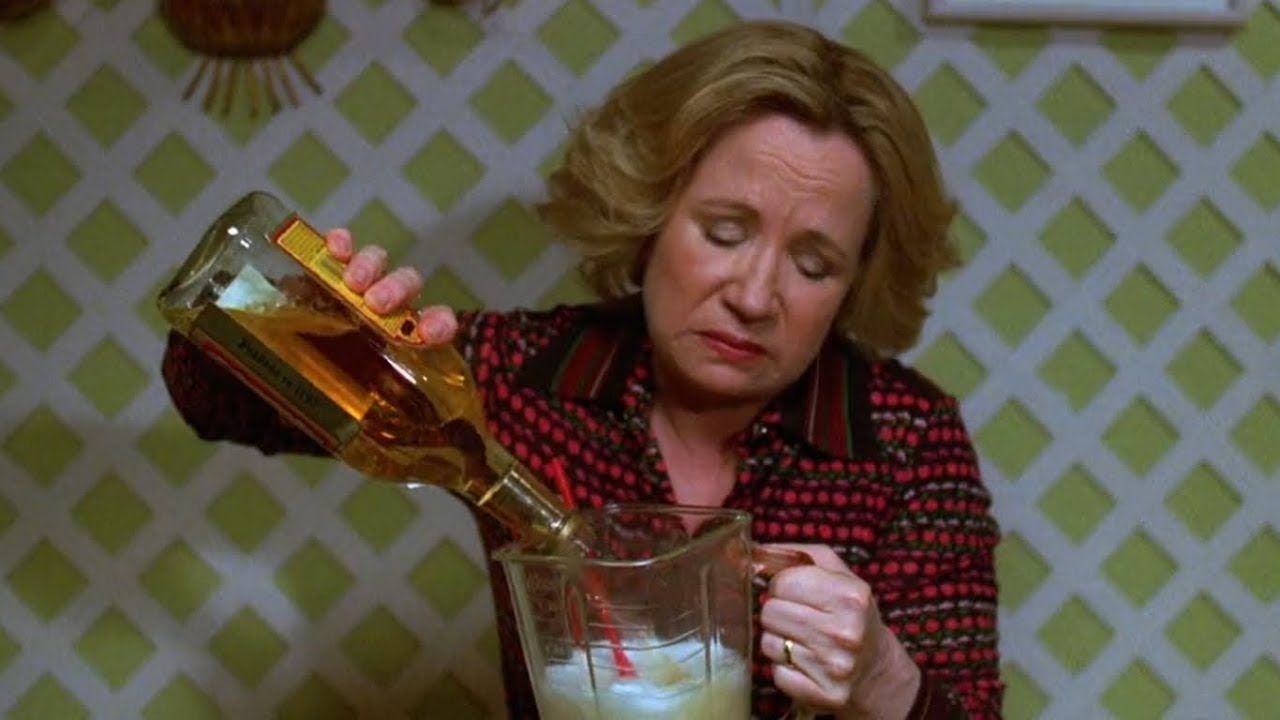[Content Note: Brief mentions of sexual assault, drug use, fatphobia, sexism, homophobia, xenophobia, and voyeurism.]
That ‘70s Show is a 200-episode trip down memory lane, with groovy garb and cultural references galore. The show follows six teenagers through the decade’s second half as they navigate personal relationships, panic about their impending adulthood, and—though never explicitly shown on-screen—smoke plenty of pot. For future stars such as Mila Kunis, Ashton Kutcher, and Topher Grace, this was their big break. But—like many sitcoms conveying ‘historically accurate humour’ (think ‘fat jokes’ in Friends and the generally problematic Sixteen Candles)—That ‘70s Show has aged somewhat clumsily.
What That ‘70s Show Does Well
Most shows aren’t renewed for eight seasons unless they’re successful at something. That ‘70s Show is full of funny moments, particularly centering around the Formans. The dynamic between Eric (Grace), his mother Kitty (Debra Jo Rupp), and his father Red (Kurtwood Smith) lays the groundwork for the show’s central plotline and invites us into the intricacies of the middle-class American family. Red is a conservative war veteran who epitomises tough love and shows disdain towards those with atypical lifestyles. Kitty, on the other hand, is compassionate and charismatic; not to mention, she’s quite the social butterfly. Then, there’s Eric, who—as Red would say—is a bit of a smart-ass. His relentless sarcasm provides many a punchline. He’s dating neighbour girl Donna (Laura Prepon) and, until season seven, is pretty directionless.
In the mid-to-late ‘70s, Eric and his friends graduate high school, get jobs, become legal adults, and leave home. The show deals, in large part, with how they grapple with these changes. In particular, Donna, the most bookish of the bunch, wants to go to college, while Eric can’t bear to let her go. They eventually decide to get married and stay put in Point Place, Wisconsin, until Eric, coming to his senses, abandons her before the wedding. He handles the situation childishly, which is not out of character; however, it comes from a good place, as he knows both he and Donna will be better off if they embrace independence. The show excels by engaging with the emotional details of these decisions.
Additionally, That ‘70s Show is a work of postmodernism, deeply engulfed in American popular culture. With references to music (Led Zeppelin, ABBA, Journey, Elton John), television (Happy Days, The Brady Bunch, Charlie’s Angels, The Jeffersons), and social-political movements (the ‘disco sucks’ movement, the hippie movement, government conspiracies, the rise of feminism), That ‘70s Show feels contextually authentic (and is actually somewhat educational!). Similarly, the outfits, interior design, and even the phrases used (“get bent” or “far out”) demonstrate that the production team did their homework.
What That ‘70s Show Does Not-So-Well
That ‘70s Show doesn’t shy away from social issues, tackling hyper-sexualization, perversion, and xenophobia. One might argue these themes are simply a sign of the times, as a show about the ‘70s would be ‘inaccurate’ if it were to overlook such social ‘norms.’ At the same time, these topics serve as running gags, normalising bigotry rather than challenging it. The show loses its effectiveness by failing to fully engage with the dark side of the decade.
Fez (Wilmer Valderrama) is arguably at the center of this controversy, being both the target of discrimination and the perpetrator of inappropriate behavior. He often hides in Donna’s closet or under her bed; while occasionally evoking a laugh (Eric hides in Donna’s closet, only to find Fez), this is a blatant invasion of privacy. Fez isn’t the only culprit; in several episodes, Eric and Hyde (Danny Masterson) spy on Donna and her mom, Midge (Tanya Roberts). The ‘peeping Tom’ trope isn’t new; in Back to the Future, Marty catches his father, George McFly, with a pair of binoculars, looking through Lorraine’s bedroom window. Voyeurism is arguably vintage, but not in a nostalgic way.
Fez is an exchange student (hence the nickname, which actually stands for F.E.S. or “foreign exchange student”), but every time he reveals his home country, a loud sound interrupts the scene. Red refuses to acknowledge Fez by name, instead using derogations; he calls Fez “the foreign kid,” “Pelé,” and “Muhammad Ali” in an attempt to ostracise him and preserve the whiteness that is 1970s Wisconsin. Fez apparently isn’t phased by these relentless microaggressions simply because he finds America fascinating.
That ‘70s Show walks the line between sexism and feminism. Donna, who works at the local radio station, earns the title “hot Donna.” While at first offended, she reclaims it as a compliment. Donna constantly rejects advances from Fez and Kelso (Kutcher), who is dating Jackie (Kunis) but sleeping with Laurie (Lisa Robin Kelly), Eric’s older sister. Despite Kelso taking advantage of multiple women at once, Laurie is the one to get branded as “easy,” “free” (as opposed to “cheap”), and a “whore.” The sexism extends beyond the screen; Hyde’s Danny Masterston was charged with multiple counts of sexual assault.
That ‘70s Show is not without fault—not even close. But for many, whether it’s the cult classic-ism, the career-defining (and in many cases, career-launching) performances, or the coming-of-age universality, it remains a timeless piece of television. Spin-off attempts may come and go, but That ‘70s Show is forever.
